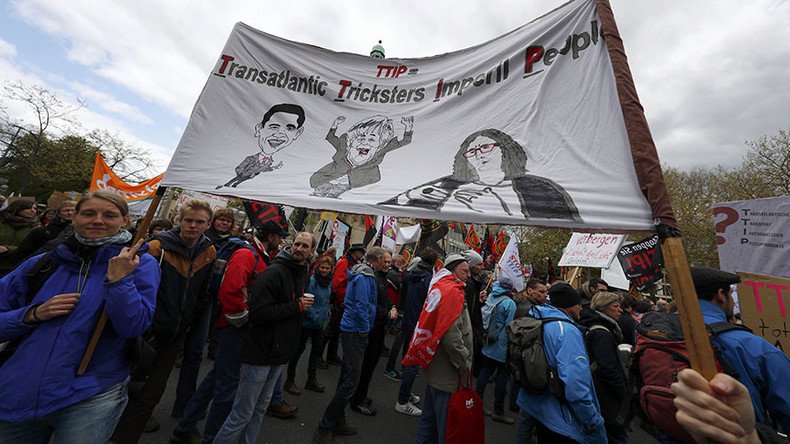TTIP-off? Greenpeace leaks confirm protesters weren't kicking up a fuss over nothing

Is there anyone left who supports TTIP? After Monday’s leaks of the negotiation texts by Greenpeace which exposed the extent of US demands surrounding the deal, it’s doubtful.
If there had been any remaining uncertainty over the dubiousness of the proposed US-EU trade agreement, the 248 pages of leaks have now removed it. TTIP was already controversial, but it may soon be the political hot potato that no one wants to touch.
Race to the bottom
The leaks reveal that the deal includes provisions which would allow American corporations to exert huge influence over European regulatory laws, potentially weakening public health and safety standards to fall more in line with those in the US. And the kicker? While the US would be granted all of this influence over EU law and standards, there would be “no guarantee of reciprocity.”
In practice the deal, if it was signed the way it stands, would give American companies much the same level of influence over and input into EU regulations as European companies have. If EU nations passed laws raising standards, American companies would be able to challenge them. If that seems like an arrangement that benefits one side more than the other, it’s because that’s exactly what TTIP is. No wonder some UK residents aren’t exactly delirious over the prospect of remaining part of an economic bloc that would consider a deal like that.
Leaked #TTIP documents reveal scope of US demands to lower or circumvent EU environment & public health protections https://t.co/WZRMGkS7n5
— Danielle Ryan (@DanielleRyanJ) May 2, 2016
But the texts released by Greenpeace expose not only new demands, but efforts to fundamentally change the face of Europe’s basic safety standards, including “details of specific threats” like the “plan to end Europe’s ban on genetically modified foods.” It’s a race to the bottom on public health and safety, according to the director of Greenpeace EU.
In another particularly interesting revelation, the German newspaper Süddeutsche Zeitung reported that Washington was threatening to block the easing of European car exports into the US in an effort to force the EU to buy more environmentally risky US farm produce.
And, if you were among those concerned about the effects of TTIP on previously agreed efforts to combat climate change, the Greenpeace leaks will have done nothing to mitigate your worries — as none of the 248 pages of leaks made any reference to the supposed global effort to cut greenhouse gas emissions, despite repeated assurances from the European Commission that this would be a top priority.
No deal?
The reasons for the secrecy surrounding these negotiations are now crystal clear. It’s not hard to decipher why the European Commission had placed a 30-year ban on public access to the key negotiating texts. If Europeans had known exactly what was being bartered over, there would have been even worse uproar. Now they do. It is a black mark on Western “transparency” and democracy that it was left to Greenpeace to provide the first real insight into how this trade agreement is being negotiated.
'The words “climate change” were not mentioned once in the 248 pages.' Unlikely to appear after 3 yrs of talks https://t.co/EmDL9R28Kc#TTIP
— TTIP of the Iceberg (@TTIPBeware) May 3, 2016
But what the leaks also reveal is that a deal is still nowhere near being done. The documents don’t represent a completed text, as Europe’s commissioner for trade Cecilia Malmstrom wrote in a blog post on Monday. They represent the negotiating positions of both sides. Malmstrom argues that this makes the “alarmist headlines” nothing more than “a storm in a teacup.”
On that she is wrong. Huge divisions and sticking points may remain, but the fact that Europe could even consider “negotiating” around safety standards to benefit American companies is beyond comprehension and certainly newsworthy. Malmstrom vehemently denied that any trade deal would ever lower Europe’s level of consumer protections — and it was a pretty steadfast denial on the face of it.
Maybe her next blog post will see her admitting either that this was a lie, or that the deal is headed nowhere but the trash bin, because given what we know of the US’s negotiating tactics, it will be one or the other. You don’t negotiate with the exceptional nation and expect to come out with much to your name.
EU leaders had already been waning in their enthusiasm for a deal in recent weeks — a promising sign that perhaps there are still some things which Europe will refuse to be pushed around on. French Prime Minister Manuel Valls had previously warned that if TTIP did not preserve France’s quality of life, the chances of an agreement would fall. Germany’s economy minister has publicly called Washington out for refusing to make concessions. Looking at the fallout from these leaks, it wouldn’t be surprising if that theme continued.
Greenpeace: #TTIPleaks reveal US's "deliberate attempts to change the EU democratic legislative process" https://t.co/vIWrYuVmDy
— Danielle Ryan (@DanielleRyanJ) May 3, 2016
The bogeyman cometh once again
Unfortunately, this is the point at which I must again mention Vladimir Putin. My apologies for the seeming irrelevance; but the powers that be simply refuse to leave him out of anything at all. Anyway, apparently he hates TTIP — which obviously, is a reason for you to love it. James Stavridis, former NATO supreme allied commander, dedicated a whole article to this in 2014. As yet another attempt to fear-monger by casting Putin as a winner or loser in something, it obviously misfired because it’s highly unlikely that any of the hundreds of thousands who have in recent months taken to the streets over TTIP, actually give a toss what Putin thinks of it. Not that this would stop the deal’s few fans from doing their utmost to involve him in the debate regardless. In April, Judy Dempsey, editor of the Strategic Europe blog at Carnegie Europe, decided to have a go herself.
A weakened transatlantic partnership is “to Russia’s benefit,” she says, and TTIP will strengthen that partnership. This is rather strange because the transatlantic partnership had been going pretty strong there for a good while without TTIP. But now, Dempsey warns, the debate has been “hijacked” by a “highly organized” anti-TTIP campaign tinged with “anti-Americanism.” Imagine the horror of highly organized protesters marching against a deal they believed would harm their democracy. Abominable indeed. But it’s all Putin’s fault, because Russia is running a “sophisticated propaganda campaign that does everything to publicize populist and [Eurosceptic] movements and anti-US sentiments.”
Only 17 percent of Germans and 18 percent of Americans think TTIP is a good thing — and it’s nothing to do with it being a corporate power grab that spells bad news for both Europeans and Americans. No, no. It’s all because of Putin’s propaganda.
A friend of mine who hasn’t kept up with the controversy surrounding TTIP asked me what all the fuss was about yesterday. I explained, in brief, what the Greenpeace leaks had revealed. Her response was simple: “But, why would we sign up for that?”
Good question.
The statements, views and opinions expressed in this column are solely those of the author and do not necessarily represent those of RT.













